- Home
- Michael McBride
Ancient Enemy Page 6
Ancient Enemy Read online
Page 6
I crept toward the trailer first, glancing back over my shoulder every few steps.
Whoomph-whoomph-whoomph.
There were curls of wood near the edge of the board, where sharp claws had gouged into the siding in an effort to pry it from the window frame. Splinters jutted from the fracture in the aged wood and the nails in the corner now protruded by more than an inch. Something wet and dark dripped from the edge of the board. I leaned closer and watched the droplets run down the siding and drip to the snow near a patch scuffed with footprints.
I turned and surveyed the darkness behind me. No sign of motion. No indication that I wasn’t completely alone, save for the goats and the horses, which stomped and huffed near the center of their enclosures, as far from the walls as they could get.
I returned my attention to the trailer. Dabbed my index finger in the fluid. Rubbed it against my thumb until it became tacky and dry.
Blood. I recognized it immediately. I’d worn more than my share of it over the last few days.
I thought back to the cave where I’d found the bodies encased in flowstone, the grooves where it looked like something had tried to claw its way through the accreted minerals to get to them, and the footprints on the ground near the jagged shards.
Whoomph-whoomph-whoomph.
I transferred the rifle to my right hand and drew the rattle from beneath my waistband with my left. Braced the stock against my shoulder and rested the barrel on my left forearm, which I tried to hold as still as possible when I shook the rattle.
The blood on the trailer and spattered around my feet phosphoresced with a bluish-purple hue. As did the palm prints on the siding I hadn’t noticed until that moment. I turned and could faintly see the droplets leading from the trailer to the stables. Directly beneath the tree in which I’d been sitting. There were smears on the latches of the enclosures.
I hadn’t heard so much as a single footstep.
I stood beneath the tree and looked up toward where I’d been sitting. There were deep gouges in the soft bark that positively glowed with blood. Mere feet below where I’d been sleeping until I’d abruptly awoken. It looked almost as if something had been climbing up—
A shrill bleating sound.
Far away. Echoing from the distant canyon walls.
Another. And another still.
I could hear their pain, feel their terror.
Tears streamed down my cheeks as I walked a circuit around my trailer and the outbuildings while I listened to the sheep being slaughtered.
Every last one of them.
FOURTEEN
I cried like I hadn’t cried since my father left. It was the same overwhelming feeling of utter and complete helplessness. No matter what I did, someone or something suffered. I had known that by leaving the sheep undefended I had consigned them to their fates. I might as well have put a bullet through each of their skulls and saved them what sounded like an agonizing and torturous death. It would have been far more humane. Whether consciously or not, I had made the decision that they would suffer when they died and I felt horrible about it. Were it within my power to do so, I would have gladly offered my life in exchange for theirs. My penance would be to never forget the awful sounds of their bleating as they were massacred. I didn’t know if I would have the strength to once again drive the truck around the river to collect their bodies and butcher them. Not that I had the time, anyway. It seemed an almost fitting final insult to let their bodies rot in the field where they died.
I watched the sun rise through eyes so tired I could barely keep them open as I shuffled in circles around our property. A part of me understood that whatever was out there had succeeded in getting what it had come for last night and had already returned to the darkness in which it dwelled, but I couldn’t afford to be wrong. So I walked until the sun cleared the mountaintops and the crows starting cawing from the field. I transferred the rattle from one hand to the other when my wrist grew sore and my fingers became numb, despite the fact that I could no longer see its ethereal glow.
I inspected the riot of footprints in the snow. Bare. Question mark-shaped. The impressions of toenails I would have ascribed to animals, were it nor for the almost human shape of the prints. And I saw the droplets of blood that led off in all directions and contemplated the implications.
If they could bleed, then they could be hurt. If they could be hurt, then they could be killed. And if they could be killed, then I had no choice but to do just that.
They were simple if-then statements. The kind we had studied in math. One right answer. Black and white.
I had proof that they could bleed, and by virtue of that proof, that they could be hurt. And anything that could be hurt could be hurt so badly that death was inevitable. Which meant that I could not waste another day waiting for them to come again. I needed to be proactive.
I needed to go on the hunt.
I had spent the better portion of my life in these very hills and knew them as well as anyone could. I knew where to find the biggest tiger salamanders and where to catch the most horny toads. I could recognize which burrows the rattlesnakes had claimed and any of the venomous species of spiders at a glance. I’d spent more hours than I could count with my grandfather, on horseback and on foot, hunting mule deer and elk and bighorn sheep. Following their tracks on the bare earth, across leaves, and through the snow. I’d learned their calls and their migration patterns and could identify their scat by smell, sight, and touch.
Finding my prey wasn’t the problem, though.
If I was right, they made their home deep within the mountain, through the hole at the back of the cavern where it looked as though they had clawed their way out. And I knew well enough that nothing that lived in the sunlight was capable of phosphorescing. I’d learned in biology class that it was an evolutionary adaptation developed by organisms that dwelled in complete darkness. And, by extension, the creatures that fed upon them.
My main concern was that going on the offensive could easily cost me my life and leave those who could not protect themselves vulnerable when night invariably fell again.
Worse, I had no idea where to begin and I was too tired to think straight. The thought of going to sleep at a time like this seemed absurd, but I could barely function now as it was. Ten hours from now I’d be completely useless.
I tucked the rifle back under the skirt and crept up the stairs, carefully placing each footfall near the sides to minimize the creaking and then avoiding the loose plank in front of the door. I opened the broken screen just far enough to slide through and ducked inside the front door into the kitchen, shedding layers as I went.
My mother was asleep on the couch, with an empty bottle of Old Forester tucked under her arm like a stuffed animal and an infomercial on the tube. Some skin care product or other with a celebrity I’d never seen before. A part of me wished she’d been awake and waiting to yell at me; the better part was grateful to have dodged yet another in a seemingly endless series of confrontations.
I was halfway to my bedroom when I stopped and turned toward Grandfather’s door. It stood partially open and I could hear his labored breathing. Not the soft rhythm of sleep, but rather the almost rasping noises that came with consciousness.
I debated continuing on my current course and pulling the covers up over my head so I couldn’t see or hear a thing, but abruptly changed my mind and entered his bedroom in a T-shirt and boxers that had definitely ripened overnight. Not as much as his urine bag, though, which took just a few minutes to change.
He followed me across the room with his eyes. I couldn’t bring myself to meet his stare. I felt like a failure, like I’d let him down. He’d undoubtedly heard the sheep being slaughtered and knew I hadn’t done a blasted thing to stop it. And if that hadn’t awakened him, then surely the sound of something attempting to pry the board from his window had.
I didn’t bother with the chair this time. I just crawled up onto the bed beside him and wrapped my arms around a on
ce-strong frame that had wasted away to mere skin and bones. Lowered my head to his chest and listened to his heartbeat, to the crackle of fluid in his lungs. And for the first time truly understood that he was going to die.
His hand brushed the back of mine and I nearly jumped. I looked down at his gnarled fingers, at the veins protruding from skin so thin it was nearly transparent. He hadn’t moved on his own since the stroke. I watched it just lying there like a dead spider, but it didn’t so much as twitch. When I looked up into his wide, horrified eyes, I saw something deep inside of them, the determination of a man who refused to be conquered, who would find a way to reach me if he had to move heaven and earth to do so.
I saw my grandfather in there.
I sat up and wiped the tears from my eyes, tried my best to be brave. He was the one who taught me that if you didn’t have confidence, you had to fake it. And if you faked something well enough, then it was only a matter of time before the illusion became reality. That advice served me well through my early years as a half-breed Navajo at a Ute school and, later, during an online distance-learning pilot program for select high school students as part of an outreach program through the University of Colorado, for which I was the only one from my reservation chosen. Maybe that concept translated to other states of being.
I stared into his eyes for several moments, attempting to decipher his thoughts, but it was like trying to see the trout in a placid lake through your own reflection.
“You know what’s happening out there, don’t you?” I whispered.
His eyes locked onto mine, then—very deliberately—looked toward his shelf and back again.
“You heard them last night. I mean, how could you not? They were right outside your window. Before they slaughtered what was left of our herd.” I cocked my head and studied his expression. “You know what they are, don’t you?”
He glanced at his shelf, then back again.
“I’ve seen what the rattle can do. I’ve been inside the House of Many Windows. I’ve seen the blood. How it phosphoresces. I know what happened to those people. Those children. I’ve seen the…bodies…entombed in the flowstone inside the cavern in Fewkes Canyon. I’ve seen what they did to our livestock and worry that it’s only a matter of time before they kill the rest. And mostly I’m afraid. Afraid they’ll find a way in here and…and…”
His eyes hardened, if such a thing was physically possible. It was how they looked when we were forced to put a wounded animal out of its misery or when he had to deal with the representatives of the Bureau of Indian Affairs when they showed up on our land, one of a man doing what he knew needed to be done, no matter how little he wanted to do so. When his eyes guided mine toward the shelf again, I got up and walked across the room.
I stood beneath a shelf now held together by silver duct tape and looked back at him. I could barely see his eyes across the dark room. I pointed at the water jar, now spider-webbed with cracks. His eyes darted to the right in response. I moved on to the rawhide parfleche with its juvenile painting. He stared directly at it.
I brought it down from the shelf and returned to the side of the bed, where I sat in the chair with it flat on my lap. A line of light from the seam around the boarded window bisected the design. It looked like something a child might have painted, certainly not something you would save unless it had been your child who painted it. The mountains were uneven and the sun about as round as a football. The paint was cracked from the fall and crumbling off in large flakes, beneath which I could see the smooth, tanned leather and…
I looked up at my grandfather, whose eyes recognized the expression on my face. Whatever hardness had been there was now gone, leaving in its place what looked like sympathy.
The dried paint chipped off with my thumbnail and covered my bare legs. The more I chiseled away, the more the design beneath was revealed. The leather had been intricately carved using an implement with such a small, sharp tip that every fine detail remained perfectly clear, despite its obvious age. It was smudged and discolored by the oils from the many hands that had held it and run their fingers over the design. At first I wondered why someone would allow a child to paint over something that must have taken an incredibly long time to create. And then the realization struck me.
It was a map.
I recognized Prater Canyon and Morefield Canyon. White’s Mesa and Big Mesa and the East Rim. And I recognized Moccasin Mesa on what was now the Ute Mountain Ute Reservation, just north of the Mancos River, which flowed less than a quarter-mile from where I was sitting now. The level of detail was astounding. It was, as far as I could tell, a perfect topographical map of this area, only created so long ago that the buffalo hide was brittle with age.
The major dwellings were represented, too. I saw Cliff Palace and Balcony House and Spruce Tree House, only they appeared somehow smaller and less significant. The older pit-houses, from the days before the early Pueblo peoples began building their fortresses high up on the canyon walls, were more prominent and centered in the middle of the map. There were dozens of them, forming a half-circle around the Sun Temple, and scattered throughout the lowlands to the south, where the Anasazi had originally farmed the land before abandoning their agricultural lifestyle in favor of the cliff dwellings and a diet that ultimately led to the discovery of remains with all of the earmarks of cannibalism.
One pit house in particular caught my eye. It was farther south than all of the others and outside of the boundaries of Mesa Verde National Monument. Wavy lines emanated from it like the rays of the sun. I knew that area well. There were no ruins anywhere near there, especially not of the pit house variety. That was Juniper Mesa and all that was up there was a vast stretch of piñon pines and junipers interspersed with a whole lot of weeds and white sand.
“I’ve been up on Juniper Mesa and not once did I see anything resembling ruins. I’m telling you, this can’t possibly be—”
My grandfather’s eyes darted to the shelf once more.
Chips of paint fell from my legs when I stood and approached the shelf. I pointed first at the water jug. His eyes told me to keep going to the right. They held steady when I reached for the ration pouch. I brought it down and pulled out the manila ticket, which was essentially what the federal government gave us in exchange for hunting our bison to the brink of extinction. According to the handwritten date, it was from the second quarter of 1885 and issued to family number fourteen of band sixteen, which, at the time, had consisted of one man, one woman, two boys and a girl, for a grand total of thirty-five rations. This was what the head of the family carried to the railroad depot and presented for the government handout he despised in order to feed his family. It was the ultimate humiliation and just another dispiriting reminder of how a proud people had resorted to begging for scraps. In this case, only ten of the fourteen rations had been punched.
I showed the ticket to Grandfather and again saw the frustration in his eyes, the lids of which had grown noticeably heavier. The beaded pouch elicited a more positive response. I shook it and then looked inside. There was something in there, something small. I dumped it out onto my palm and stared at it for a long moment before again seeking my grandfather’s eyes, only to find him fast asleep.
FIFTEEN
I gave up on sleep and chased my exhaustion with spoonfuls of instant coffee I washed down with Mountain Dew. My hands shook, my heart jackhammered, and my head ached like something was trying to force its way out through the base of my skull, but I was somewhat alert and functional, which was about as much as I could hope for under the circumstances.
I saddled up Yanaba and struck off under the blazing sun, which turned the snow to slush that would revert to ice when it set again. It was already uncomfortably high in the sky and climbing by the second. I was grateful I didn’t wear a watch or I’d be checking it every few seconds. As it was, I looked at the sun so often my vision was filled with red and pink blobs. By the time we reached Juniper Mesa it had to be close to lunchtime. At
least that’s what my stomach told me, but all of that caffeine had hit it like a gallon of acid and it made all sorts of noises that could have been anything from hunger to outright revolt.
The mesa itself was so long and flat that it was nearly impossible to tell it was a mesa until you reached the far end to the south and the hundred-foot deadfall to the valley below it, which, as far as such things went, was rather unspectacular. Sandstone showed through the windswept snow, from the cracks of which grew the twisted and forked trunks of evergreens, many of them brown and skeletal, others well on their way there. The crisp leaves of the scrub oak still clung to the branches like so many dead butterflies.
I didn’t know where to start. I was surrounded by a veritable forest maybe ten to twelve feet in height, just tall enough that I couldn’t see over the trees from Yanaba’s back as we wended our way aimlessly through the thickets and I thought about all of the times I’d been hunting up here with Grandfather. Most of the time, the deciduous trees had been bare and there’d been snow on the ground and we’d been following hoof prints on foot. I’d been so focused on the tracks that I hadn’t paid any attention to my surroundings. With the exception of the sporadic ponderosa pine, every tree looked just like the last and I found myself questioning my sense of direction with the way the forest dictated our course.
I tried to think about this logically. If the map was consistent—which I had no reason to doubt—I was looking for a pit house. By definition, that meant it had once been a wood-framed structure covered with mud-plastered brush, built over an area of excavated earth prior to the end of the first millennium. They’d been erected near fields that the inhabitants farmed using primitive means of watering their crops since rainfall alone in this corner of the state was nowhere near enough. Runoff irrigation—sowing seeds where mesa tops or other natural formations diverted the runoff from the occasional storms—was especially common. They would have needed soil, too. More than sand and gravel that surrounded me now, anyway.

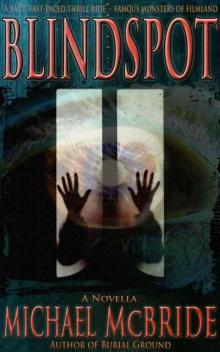 Blindspot
Blindspot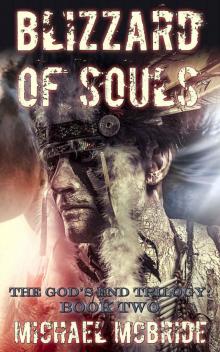 Blizzard of Souls
Blizzard of Souls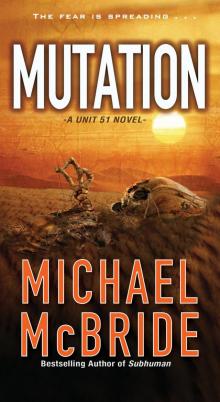 Mutation
Mutation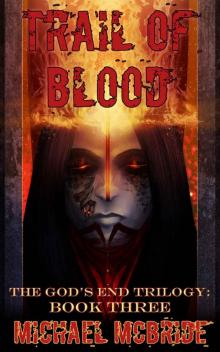 Trail of Blood
Trail of Blood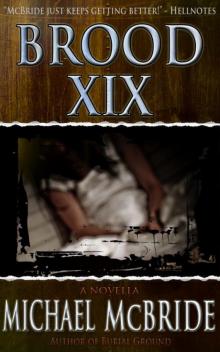 Brood XIX
Brood XIX The Fall
The Fall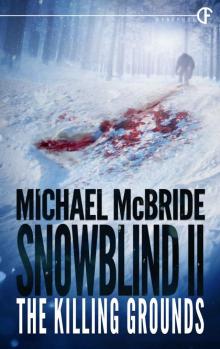 Snowblind II: The Killing Grounds
Snowblind II: The Killing Grounds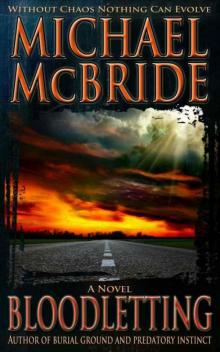 Bloodletting
Bloodletting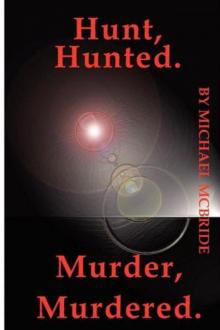 Hunt Hunted, Murder Murdered
Hunt Hunted, Murder Murdered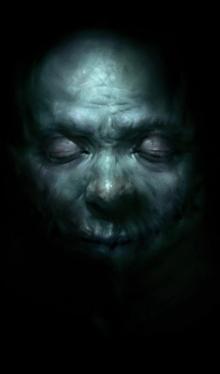 The Bloodspawn
The Bloodspawn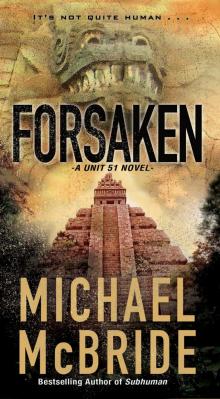 Forsaken
Forsaken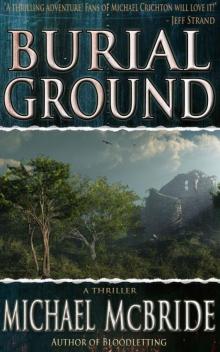 Burial Ground
Burial Ground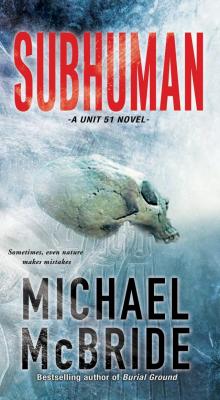 Subhuman
Subhuman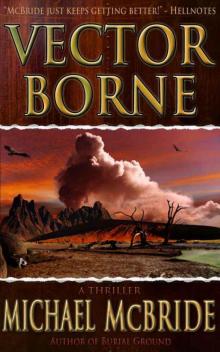 Vector Borne
Vector Borne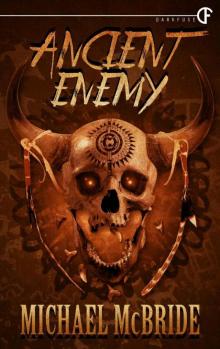 Ancient Enemy
Ancient Enemy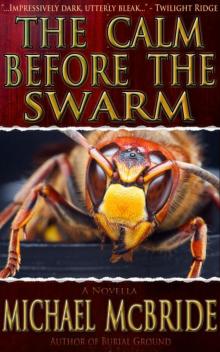 The Calm Before The Swarm
The Calm Before The Swarm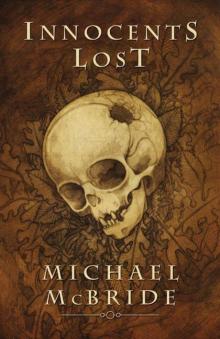 Innocents Lost
Innocents Lost Condemned: A Thriller
Condemned: A Thriller